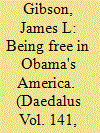| Srl | Item |
| 1 |
ID:
121028


|
|
|
|
|
| Publication |
2012.
|
| Summary/Abstract |
Many studies of interracial differences in rates of political participation pay too little attention to African Americans' perceptions of whether they can freely participate in politics. Survey evidence collected over the last several decades has consistently shown that black Americans perceive much less political freedom available to them than do white Americans. The gap in perceived freedom has narrowed somewhat in recent years but remains large. Following the empowerment hypothesis of Lawrence Bobo and Franklin Gilliam, black perceptions of freedom increased with the election of Barack Obama to the American presidency. But perhaps unexpectedly, the empowerment bonus has not persisted, especially among conservative and fundamentalist blacks. Because African Americans do not perceive that their government would permit various types of political action, it is likely that substantial interracial differences exist in non-voting types of political participation, especially political action directed against governmental authority.
|
|
|
|
|
|
|
|
|
|
|
|
|
|
|
|
| 2 |
ID:
102119


|
|
|
|
|
| Publication |
2011.
|
| Summary/Abstract |
This essay explores some of the reasons for the continuing power of racial categorization in our era, and thus offers some friendly amendments to the more optimistic renderings of the term post-racial. Focusing mainly on the relationship between black and white Americans, it argues that the widespread embrace of universal values of freedom and equality, which most regard as antidotes to racial exclusion, actually reinforce it. The internal logic of these categories requires the construction of the "other." In America, where freedom and equality still stand at the contested center of collective identity, a history of racial oppression informs the very meaning of these terms. Thus the irony: much of the effort exerted to transcend race tends to fuel continuing division.
|
|
|
|
|
|
|
|
|
|
|
|
|
|
|
|
| 3 |
ID:
193681


|
|
|
|
|
| Summary/Abstract |
Existing research largely ignores Black support for punitive policies that target group members, even as this support challenges expectations of in-group favoritism and group solidarity. The current research fills this gap by leveraging a familiar concept: “the politics of respectability.” Building on historical and qualitative accounts of this worldview, which focuses on the behavior of group members, I develop a social psychological framework to understand how identity-based concerns motivate Black support for punishment that targets members of their racial group. I also develop a novel measure of respectability–the Respectability Politics Scale. Findings demonstrate that adherents of respectability feel more ashamed about the public view of their racial group, endorse more negative racial stereotypes, and feel relatively less close to other Black people. They are also more likely to support a range of punitive policies that target group members, including restrictive dress code policies, tough-on-crime policies, and paternalistic welfare policies.
|
|
|
|
|
|
|
|
|
|
|
|
|
|
|
|